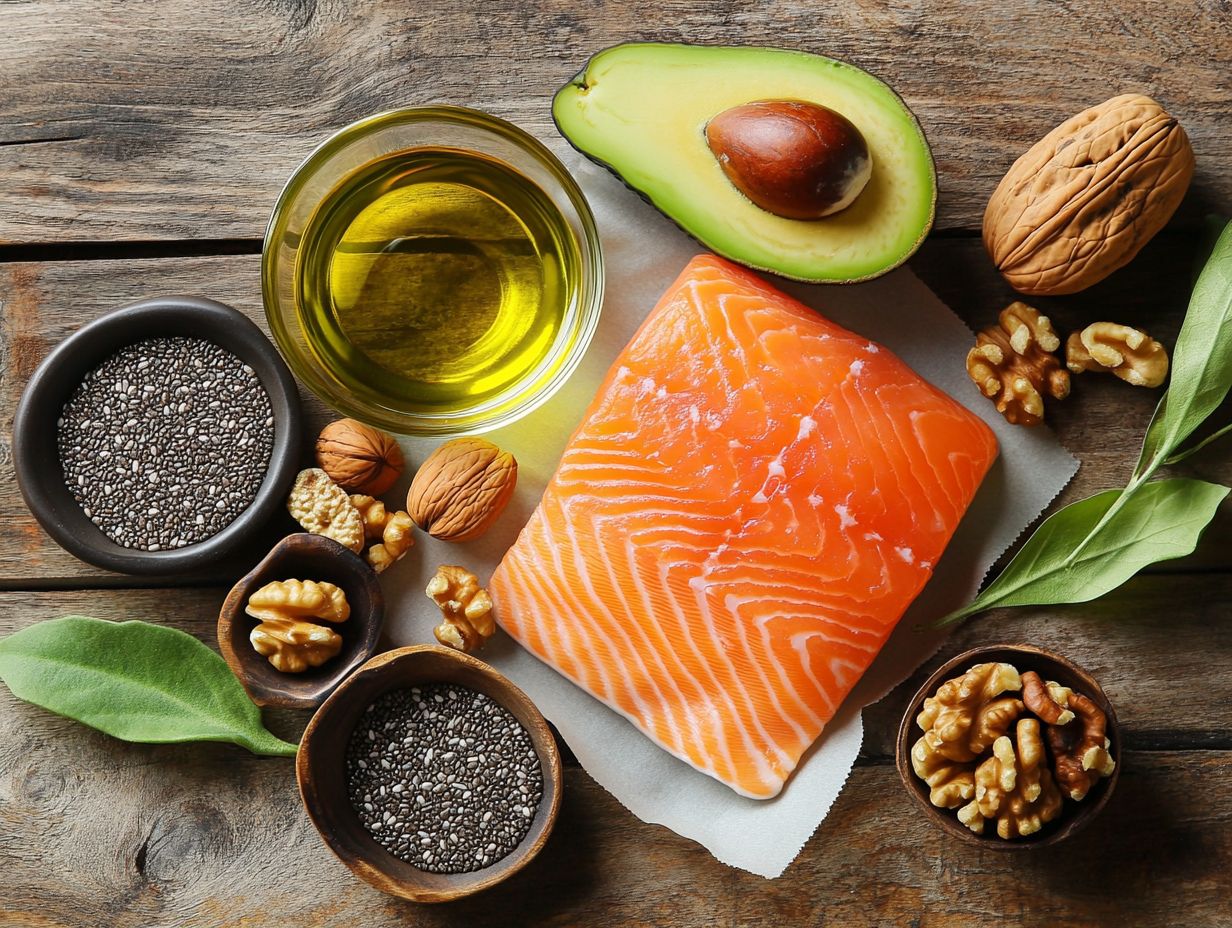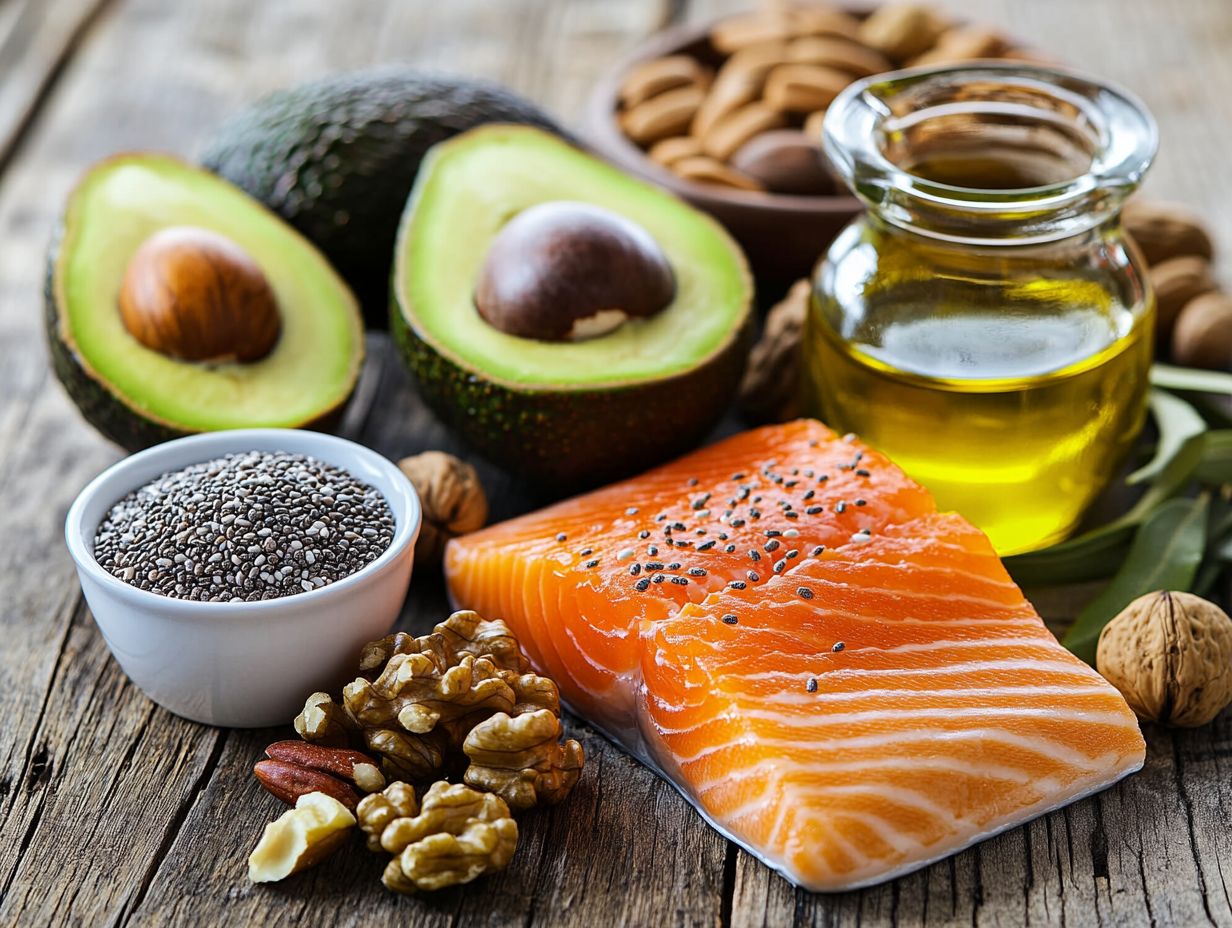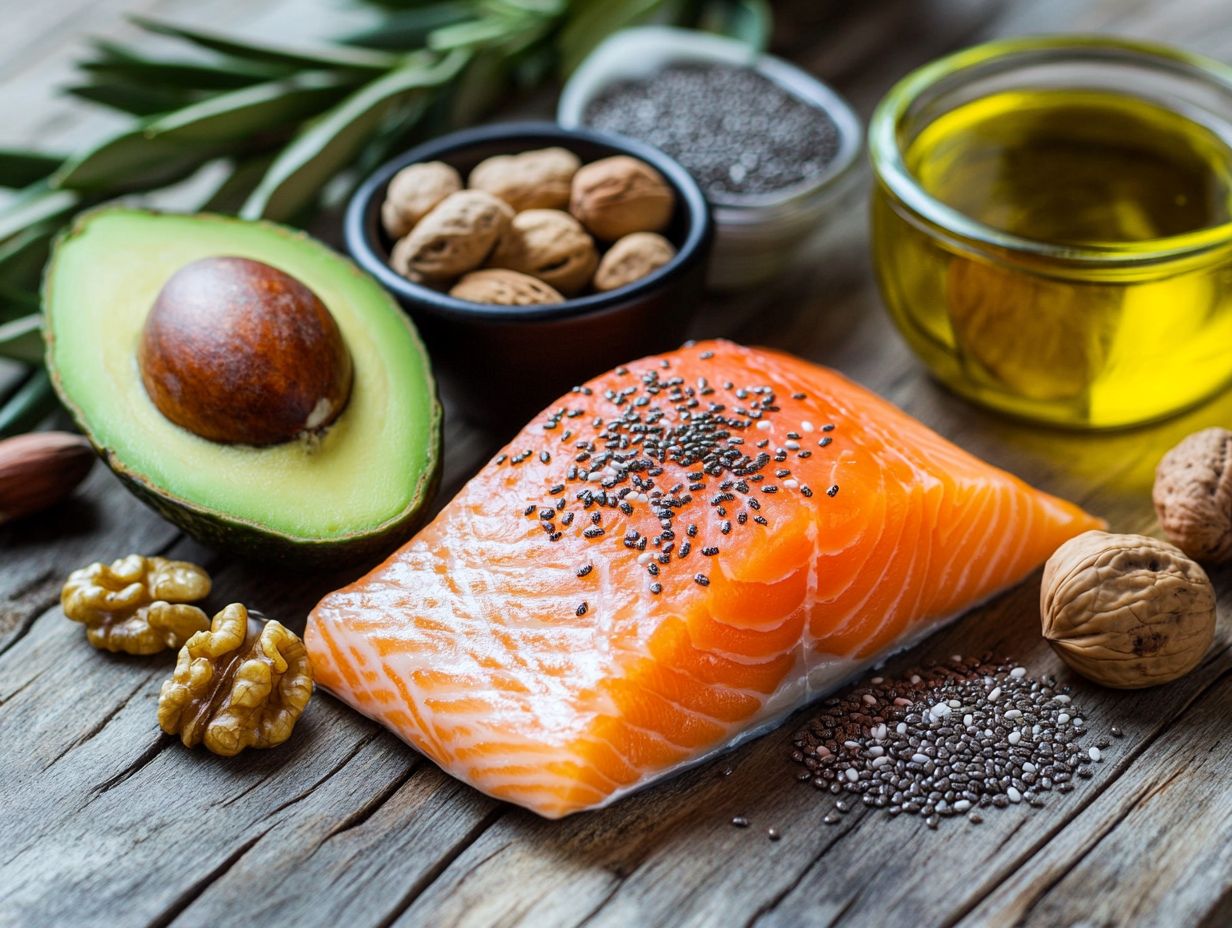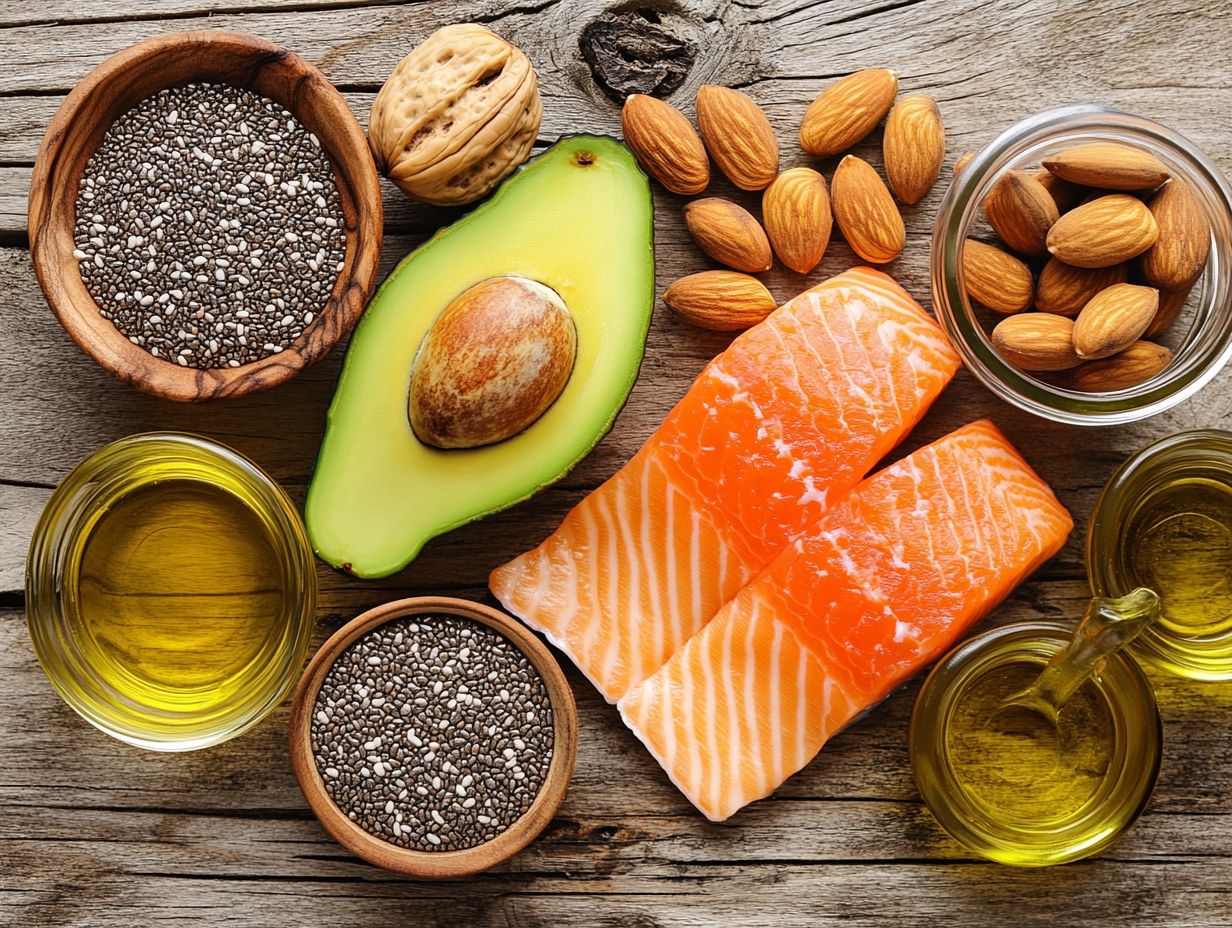How to Get Enough Essential Fatty Acids
Essential fatty acids (EFAs) are vital for your overall health, yet many remain unaware of their importance. These unique fats, which your body cannot produce on its own, play pivotal roles in brain function, inflammation regulation, and heart health.
This piece delves into what EFAs are, why they matter, and where to find them in your diet. You’ll also discover practical tips on incorporating them into your daily meals and explore options for supplementation.
Start adding essential fatty acids to your diet today for a healthier you!
Contents
- Key Takeaways:
- Understanding Essential Fatty Acids
- Why EFA Intake is Important
- Sources of Essential Fatty Acids
- Boost Your Diet with Essential Fatty Acids Today!
- Supplementing with EFAs
- Frequently Asked Questions
- What are essential fatty acids and why are they important?
- Looking for great sources of essential fatty acids? Check this out!
- How much essential fatty acids do I need to consume?
- Can I take supplements to get enough healthy fats?
- Are there risks from too much healthy fat?
- What happens if I don’t get enough healthy fats?
Key Takeaways:

EFA intake is crucial for maintaining overall health. They play a vital role in various bodily functions. Consider plant-based sources like avocados and nuts, as well as animal-based sources such as salmon and eggs, to incorporate EFAs into your diet.
Using high-quality EFA supplements can help ensure you meet your daily requirements. Always consult with a healthcare professional before starting any supplementation.
Understanding Essential Fatty Acids
Understanding essential fatty acids (EFAs) is key to maintaining your health. These nutrients are critical for various bodily functions and processes.
EFAs, particularly omega-3 fatty acids, are essential for supporting brain health, cardiovascular well-being, and managing inflammation. Omega-3s include alpha-linolenic acid (ALA), eicosapentaenoic acid (EPA), and docosahexaenoic acid (DHA).
These nutrients help prevent chronic diseases. They also enhance your immune system, making them vital for a balanced diet. The American Heart Association underscores the importance of incorporating EFAs into your daily nutrition for optimal health benefits.
What are Essential Fatty Acids?
Essential fatty acids (EFAs) are healthy fats your body cannot produce, so it s necessary to include them in your diet. These nutrients are crucial for your overall health.
You ll primarily find omega-3 and omega-6 fatty acids, each playing distinct roles in maintaining your well-being.
Omega-3 fatty acids, often found in fish oil and flaxseeds, support heart health, enhance brain function, and stabilize mood due to their anti-inflammatory properties.
Omega-6 fatty acids, abundant in vegetable oils and nuts, primarily contribute to cellular function and energy production. While both types are essential, it s important to balance their intake. Too much omega-6 can lead to inflammation, highlighting the need for a well-rounded diet.
Why EFA Intake is Important
EFA intake is essential for your health. A deficiency can lead to a range of issues, including cardiovascular diseases and cognitive decline.
Make sure you re getting enough omega-3 fatty acids to unlock numerous health benefits, such as reducing inflammation and enhancing brain function.
The American Heart Association emphasizes diets rich in omega-3s as a proactive measure against chronic diseases. Incorporate these vital nutrients into your daily nutrition.
The Role of EFAs in the Body
EFAs play multiple roles in your body, contributing to essential processes like brain function, heart health, and immune response, enhancing your overall well-being.
These fatty acids are particularly crucial for cognitive function. They are a significant part of your brain’s structure, influencing neurotransmission and mood regulation.
They also support cardiovascular health by promoting healthy cholesterol levels and reducing inflammation, both key in preventing heart disease.
In terms of managing inflammation, EFAs can modulate the production of pro-inflammatory molecules, helping keep chronic inflammatory conditions in check.
By supporting these critical functions, EFAs enable your body to maintain optimal health and vitality.
Sources of Essential Fatty Acids

Essential fatty acids (EFAs) are crucial nutrients you need to incorporate into your diet. You’ll find omega-3-rich foods in both plant and animal sources, giving you plenty of options to satisfy your preferences.
Fatty fish are excellent sources of these nutrients. Consider incorporating:
- Salmon
- Mackerel
- Sardines
These fish are particularly rich in two types of omega-3 fatty acids, which are essential for your health. On the plant side, consider flaxseed, walnuts, and various plant oils that provide alpha-linolenic acid (ALA). These additions can help you meet your daily omega-3 needs.
By familiarizing yourself with these diverse food sources, you can make informed dietary choices that meet your nutritional needs.
Plant-based Sources
Plant-based sources of omega-3s primarily offer ALA, which can be found in a delightful variety of foods like flaxseed, walnuts, chia seeds, and seaweed.
These options serve as great alternatives to traditional fish oils and deliver impressive health benefits. Omega-3s are known to fight inflammation and improve heart health.
Here are some tasty ways to incorporate these nutrient-rich foods into your meals:
- Add ground flaxseed to your smoothies or oatmeal.
- Snack on walnuts.
- Prepare chia seed pudding as a wholesome dessert.
Integrating seaweed into your salads or sushi can introduce unique flavors while enhancing your omega-3 intake. By diversifying your diet with these foods, you ll find it easier to meet essential nutrient requirements and embrace a healthier lifestyle overall.
Animal-based Sources
Animal-based sources of omega-3 fatty acids primarily come from fatty fish, which are abundant in two types of omega-3 fatty acids essential for your health.
These omega-3s are known for reducing inflammation, supporting heart health, and enhancing brain function. If you’re not consuming enough fish, supplements like cod liver oil provide a convenient alternative and offer beneficial nutrients such as vitamins A and D.
Fish like salmon, mackerel, and sardines are delicious ways to integrate omega-3s into your meals while delivering high concentrations of these beneficial fatty acids.
Understanding these sources helps you make informed choices that positively impact your overall well-being.
Boost Your Diet with Essential Fatty Acids Today!
Incorporating essential fatty acids (EFAs) into your diet requires thoughtful choices to include omega-3-rich foods. This ensures you meet recommended daily intake guidelines.
Aim to enjoy fatty fish at least twice a week. Also, integrate plant-based sources like flaxseed and walnuts into your meals.
Recognizing the significance of omega-3 dosage and exploring dietary guidelines can significantly elevate your health and overall well-being.
Recommended Daily Intake
The recommended daily intake of omega-3 fatty acids varies based on age, gender, and health conditions. Generally, adults should aim for a minimum of 250-500 mg of EPA and DHA combined.
If you’re pregnant or nursing, consider increasing your intake to support fetal and infant brain development, with recommendations often around 200-300 mg of DHA daily. For children, requirements typically range from 100-200 mg based on their age and dietary habits.
ALA, found mainly in plant sources such as flaxseeds, chia seeds, and walnuts, is crucial for those following a vegetarian or vegan lifestyle. EPA and DHA predominantly come from fish like salmon and mackerel, as well as algae supplements for those who prefer to avoid animal products.
By ensuring a balanced intake through various food sources, you can maintain optimal health throughout different life stages.
Key Takeaways:
- Essential fatty acids are vital nutrients for your health.
- Incorporate both plant and animal sources of omega-3s into your diet.
- Aim for a balanced intake and consult guidelines for your specific needs.
Don t wait to boost your health start adding these foods today!
Tips for Meeting EFA Requirements

You can meet your essential fatty acid (EFA) requirements with smart dietary choices. Focus on seafood and, if needed, supplementation.
Incorporate a variety of foods high in omega-3 fatty acids into your daily meals. Consider options like salmon, mackerel, chia seeds, and walnuts to significantly enhance your health and well-being.
Crafting a grocery list that prioritizes these ingredients streamlines your shopping experience and fosters healthier eating habits.
Try adding flaxseed oil to your smoothies or enjoy a handful of nuts to boost your EFA intake.
Struggling to get enough EFAs? Try high-quality omega-3 supplements to bridge nutritional gaps without sacrificing convenience. Just remember to consult with a healthcare provider before starting any new supplement regimen.
Supplementing with EFAs
Supplementing with essential fatty acids (EFAs) can effectively ensure adequate intake, especially for those who may not include enough foods high in omega-3 fatty acids in their diet.
Popular options for omega-3 supplements include fish oil, krill oil, and algal oil. Each offers distinct benefits and varying concentrations of EPA and DHA.
When considering supplementation, select high-quality products and follow dietary guidelines for appropriate dosages. This is especially important for individuals with specific health conditions or those who are pregnant.
Types of EFA Supplements
There are several types of EFA supplements available:
- Fish oil: Typically derived from fatty fish, it boasts a high concentration of EPA and DHA, both known for their heart health benefits.
- Krill oil: Extracted from tiny crustaceans, it contains powerful antioxidants and omega-3s that may enhance absorption.
- Algal oil: A fantastic alternative for plant-based diets, it provides a sustainable source of omega-3s without any animal products.
By understanding these variations, you can make an informed choice about which supplement aligns best with your health goals and dietary preferences.
Considerations and Precautions
When considering EFA supplementation, understand potential interactions and precautions, especially if you have existing health conditions or take medications.
If you’re on anticoagulants, heightened effects may increase your risk of bleeding. For diabetes, monitor your blood sugar levels, as certain fatty acids can affect glucose metabolism.
If you have liver disorders, consulting with a healthcare professional before starting any supplementation is essential, as EFAs might worsen underlying issues.
During pregnancy or breastfeeding, seeking medical advice is critical to ensure the health and safety of both you and your baby.
A thorough evaluation of your personal health history and current treatments can lead you to a more informed and safer approach to EFA supplementation.
Frequently Asked Questions
What are essential fatty acids and why are they important?

Essential fatty acids (EFAs) are types of fats that our bodies cannot produce on their own, so we must obtain them through our diet. They play a crucial role in maintaining overall health, including brain and heart function, and reducing inflammation.
Looking for great sources of essential fatty acids? Check this out!
Some excellent sources of essential fatty acids include:
- Fatty fish like salmon, tuna, and sardines
- Plant-based oils such as olive, canola, and flaxseed oil
- Nuts and seeds like almonds, walnuts, and chia seeds
How much essential fatty acids do I need to consume?
The recommended daily intake of essential fatty acids varies depending on age, gender, and individual health needs. Generally, adults should aim for 1-2 servings of fatty fish per week while incorporating plant-based sources into their daily diet.
Can I take supplements to get enough healthy fats?
Yes, some people may need supplements to meet their daily needs. However, it’s best to include food sources first and talk to a healthcare professional before starting any supplements.
Are there risks from too much healthy fat?
Yes, consuming too many omega-3 fatty acids can increase bleeding risk and interfere with blood-thinning medications. Always consult a healthcare professional before making major changes.
What happens if I don’t get enough healthy fats?
Not getting enough healthy fats can lead to issues like dry skin and cognitive decline. It can also raise your risk of serious conditions like heart disease and diabetes. Make sure to include a variety of food sources!






